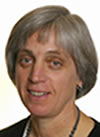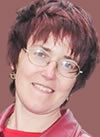| >>> Go directly to: [Friday - December 09] [Saturday - December 10] |
|
| Thursday – December 08, 2011 |
| 11:00 am – 1:00 pm |
Registration |
| 1:00 pm – 1:45 pm |
Keynote 1
The Future of Research Communication: From Surfing to Deep Diving
Judith A. Blake, PhD
Associate Professor
The Jackson Laboratory
Bar Harbor, Maine - USA |
| 1:45 pm – 1:55 pm |
Oral Presentation 1
The Rat Genome Curation: RGD Automated Data Integration Pipelines Maximize Coverage
Presenter: Marek Tutaj, Medical College of Wisconsin
Authors: Marek Tutaj, Mary Shimoyama, Elizabeth Worthey, Jennifer Smith, Howard Jacob
 PDF of Presentation PDF of Presentation
|
| 1:55 pm – 2:05 pm |
Oral Presentation 2
A Sensemaking Model for the Explorative Analysis of Large Gene Lists
Presenter: Carsten Görg, University of Colorado Denver
Authors: Carsten Görg, Barbara Mirel, Hannah Tipney
 PDF of Presentation PDF of Presentation |
| 2:05 pm – 2:15 pm |
Oral Presentation 3
The Role of p53 in Oligodendrocyte UPR
Presenter: Hasan Jamil, Wayne State University
Author: Hasan Jamil
 PDF of Presentation PDF of Presentation |
| 2:15 pm – 2:25 pm |
Oral Presentation 4
Quantitative Data: Where are they Hidden in Biomedical Literature?
Presenter: Komandur Ravidumar, University of Colorado School of Medicine
Authors: K.E. Ravikumar, Meenakshi Narayanaswamy, S.V. Ramanan
 PDF of Presentation PDF of Presentation |
| 2:25 pm – 2:35 pm |
Oral Presentation 5
Multiscale Patient-Specific Blood Systems Biology
Presenter: Scott Diamond, University of Pennsylvania
Authors: Scott L. Diamond |
| 2:35 pm – 2:45 pm |
Oral Presentation 6
A Resource for the Rational Selection of Drug Target Proteins and Leads for the Malaria Parasite, Plasmodium Falciparum
Presenter: Fourie Joubert, University of Pretoria
Authors: Jeanre Smit, Phele Mpangase, Michal Szolkiewicz, Misha le Grange, Fourie Joubert
 PDF of Presentation PDF of Presentation |
| 2:45 pm – 3:00 pm |
Break (15 minutes) |
| 3:00 pm – 3:10 pm |
Oral Presentation 7
Identifying Treatment Relevant Colorectal Cancer Subtypes Using Iterative Non-negative Matrix Factorization
Presenter: Andreas Schlicker, Netherlands Cancer Institute
Authors: Andreas Schlicker, Garry Beran, Christine M Chresta, Gael McWalter, Alison Pritchard, Susie Weston, Sarah Runswick, Sara Davenport, Kerry Heathcote, Denis Alferez Castro, George Orphanides, Tim French, Lodewyk FA Wessels |
| 3:10 pm – 3:20 pm |
Oral Presentation 8
The Origin of Mammalian Placentation Correlates with Protein Functional Shift and the Emergence of New Control Mechanisms
Presenter: Mary O'Connell, Dublin City University
Authors: Thomas A. Walsh, Kieran Holohan, Anna O'Brien, Robert Carton, Elinor Velasquez, Claire C. Morgan, Noeleen B. Loughran, Mary J. O'Connell |
| 3:20 pm – 3:30 pm |
Oral Presentation 9
Exploring and Profiling Long Non-coding RNA in T Cell Development Using Next Generation Sequencing and Bioinformatics Approaches
Presenter: Tzu L. Phang, University of Colorado Denver
Authors: Tzu L. Phang, Ping Yao Zeng, Edwin.F. de Zoeten |
| 3:30 pm – 3:40 pm |
Oral Presentation 10
Building an Interactome to Identify Signaling Components
Presenter: Sarah Wyatt, Ohio University
Authors: Sarah Waytt, Kaiyu Shen |
| 3:40 pm – 3:50 pm |
Oral Presentation 11
GeneSmash: A RESTful Web Service for Gene Annotations
Presenter: Ganiraju Manyam, University of Texas Anderson Cancer Center
Authors: Michelle Payton, Ganiraju Manyam, Chris Wakefield, Jack Roth, Lynne Abruzzo, Kevin Coombes |
| 3:50 pm – 4:00 pm |
Oral Presentation 12
Integrating Curated Databases and Text Mining Output into a Biomedical Knowledge Base
Presenter: Kevin Livingston, University of Colorado Denver
Authors: Kevin M. Livingston, Michael Bada, William A. Baumgartner Jr, Yuriy Malenkiy, Lawrence E. Hunter
 PDF of Presentation PDF of Presentation |
| 4:00 pm – 4:10 pm |
Oral Presentation 13
Using Evolving Protein Networks to Inform the Graph Coloring Problem
Presenter: Todd Gibson, University of Colorado Denver
Authors: Todd A. Gibson, Debra S. Goldberg |
| 4:10 pm – 4:25 pm |
Break (15 minutes) |
| 4:25 pm – 5:10 pm |
Keynote 2
Building Cell Maps: Status and Challenges
Emek Demir, PhD
Computational Biology Center
Memorial Sloan Kettering Cancer Center
New York, New York - USA |
| 5:10 pm – 5:20 pm |
Oral Presentation 14
Machine Approaches to Recognition of Trypanosomal Variant Surface Glycoprotein Sequences
Presenter: Jon Wilkes, Wellcome Trust Centre for Molecular Parasitology
Author: Jon Wilkes
 PDF of Presentation PDF of Presentation |
| 5:20 pm – 5:30 pm |
Oral Presentation 15
Compact Encoding for Gene Therapy
Presenter: Roger Hall, University of Arkansas at Little Rock
Author: Roger Hall
 PDF of Presentation PDF of Presentation |
| 5:30 pm – 5:40 pm |
Oral Presentation 16
Microbial Monitoring and Space Exploration
Presenter: Sven Bilke, NCI
Authors: Sven Bilke, Verena Starke |
| 5:40 pm – 5:50 pm |
Oral Presentation 17
CodingMotif: Exact Determination of Overrepresented Nucleotide Motifs in Coding Sequences
Presenter: Jeffrey Chuang, Boston College
Authors: Yang Ding, Andy Lorenz, Jeffrey Chuang
 PDF of Presentation PDF of Presentation |
| 5:50 pm – 6:00 pm |
Oral Presentation 18
GO Classes or Biclusters? Alternative Approaches for Exploring Microarray Probeset Subsets
Presenter: George Acquaah-Mensah, Massachusetts College of Pharmacy and Health Sciences
Author: George Acquaah-Mensah
 PDF of Presentation PDF of Presentation |
| 6:00 pm – 6:10 pm |
Oral Presentation 19
Accurate Inferring Transcription Regulation from a Compendium of Expression Profiles
Presenter: Xueling Li, University of Texas, Medical Branch
Authors: Xueling Li, Dirar Homouz, Andrzej Kudlicki
 PDF of Presentation PDF of Presentation |
| 6:10 pm – 6:20 pm |
Oral Presentation 20
A Proposed Algorithm for Epistasis Detection using Frequent Item-sets and Mutual Information
Presenter: James Rudd, North Carolina University
Author: James Rudd, Assefa Tesfay, ClarLynda Williams-DeVane, Gaolin Zheng
 PDF of Presentation PDF of Presentation |
| 7:00 pm – 9:00 pm |
Banquet, Thursday, December 8, 2011
7:00 pm - 9:00 pm Banquet
Location: Il Poggio Restaurant, Snowmass Village
Note: The Dec 08 banquet has sold out. To be placed on a wait list, please email This email address is being protected from spambots. You need JavaScript enabled to view it.. |
| >>> Go directly to: [Thursday - December 08] [Saturday - December 10] |
|
| Friday – December 09, 2011 |
| 9:00 am – 9:45 am |
Keynote 3
Project Halo: Constructing and Exploiting a Formal Representation of a Biology Textbook to Understand and Answer Users' Questions
Peter Clark, PhD
Vulcan Inc.
Seattle, Washington - USA |
| 9:45 am – 9:55 am |
Oral Presentation 21
Molecular Insights to the Drug Resistance of V32I & M46L HIV-1 Protease Mutant to Inhibitor TMC114: Free Energy Calculation and Molecular Dynamics Simulations
Presenter: Biswa Meher, Albany State University
Authors: Biswa R. Meher, Yixuan Wang |
| 9:55 am – 10:05 am |
Oral Presentation 22
Testing the Ortholog Conjecture with Functional Data from Several Pairs of Closely Related Organisms
Presenter: Wyatt Clark, Indiana University
Authors: Wyatt T. Clark, Predrag Radivojac, Matthew Hahn |
| 10:05 am – 10:15 am |
Oral Presentation 23
Functional Profiling of Pharmacogenetic Non-synonymous SNPs
Presenter: Chet Seligman, Buck Institute for Research on Aging
Authors: Chet Seligman, Janita Thusberg, Jackson Miller, Emidio Capriotti, Jim Auer, Michelle Whirl-Carrillo, Teri Klein, Sean Mooney
 PDF of Presentation PDF of Presentation |
| 10:15 am – 10:25 am |
Oral Presentation 24
Limitations of Automated Annotation Software When Used with Draft Genomic Assemblies
Presenter: Robert Norgren, University of Nebraska Medical Center
Author: Robert B. Norgren, Jr.
 PDF of Presentation PDF of Presentation |
| 10:25 am – 10:35 am |
Oral Presentation 25
Mixed Primary-Secondary Structure Alignment of ncRNA Covariance Models for Model Clustering and Combination
Presenter: Jennifer Smith, Boise State University
Author: Jennifer Smith
 PDF of Presentation PDF of Presentation |
| 10:35 am – 10:45 am |
Oral Presentation 26
In Silico Gene Expression Based Analysis on Claudin Family Members Association with Human Thyroid Cancer
Presenter: Shaukat Malik, Mohammad Ali Jinnah University
Authors: Shaukat Malik, S. Sameen, Z. Khalid |
| 10:45 am – 11:00 am |
Break (15 minutes) |
| 11:00 am – 11:10 am |
Oral Presentation 27
Data Management and Analysis Solutions for Meta-Analysis of Multi-Domain Data
Presenter: ClarLynda Williams-Devane, North Carolina Central University
Authors: ClarLynda Williams-DeVane, Archana Radadia, Nina Rountree, Stephen Edwards
 PDF of Presentation PDF of Presentation |
| 11:10 am – 11:20 am |
Oral Presentation 28
STOP and DEFOG: Web Applications for a Comprehensive Functional Gene Set Analysis
Presenter: Tobias Wittkop, Buck Institute for Research on Aging
Authors: Tobias Wittkop, Emily Teravest, Ari E. Berman, Uday Evani, K. Mathew Fleisch, Corey Powell, Nigam Shah, Sean D. Moone
 PDF of Presentation PDF of Presentation |
| 11:20 am – 11:30 am |
Oral Presentation 29
DAVID-WS: A Stateful Web Service to Facilitate Gene/Protein List Analysis
Presenter: Xiaoli Jiao, NIH/NIAID
Authors: Xiaoli Jiao, Brad T. Sherman, Da Wei Huang, Richard A. Lempicki
 PDF of Presentation PDF of Presentation |
| 11:30 am – 11:40 am |
Oral Presentation 30
Predicting Transcription Factor Binding Sites with Hidden Markov Models by using ChIP-Seq Data
Presenter: Anthony Mathelier, University of British Columbia
Authors: Anthony Mathelier, Wyeth W. Wasserman
 PDF of Presentation PDF of Presentation |
| 11:40 am – 11:50 am |
Oral Presentation 31
The Critical Assessment of Function Annotation Experiment: A Community-wide Effort Towards a Better Functional Annotation of Genes and Genomes
Presenter: Predrag Radivojac, Indiana University
Authors: Predrag Radivojac, Sean Mooney, Iddo Friedberg
|
| 11:50 am – 12:00 pm |
Oral Presentation 32
In Silico Rational Drug Design and Modeling Studies of Novel Inhibitors for Multi-target Inhibition in Pseudomonas Aeruginosa
Presenter: Premkumar Jayaraman, Nanyang Technological University
Authors: Premkumar Jayaraman, Lim Chu Sing Daniel, Meena K. Sakharkar
 PDF of Presentation PDF of Presentation |
| 12:00 pm – 12:30 pm |
Keynote 4
Advances in Protein Biomarker Discovery: Controlling for Sample Handling Artifacts and Confounding Effects
Mike Mehan, PhD
SomaLogic
Boulder, CO - USA |
| 12:30 pm – 4:00 pm |
Break |
| 4:00 pm – 4:45 pm |
Keynote 5
Deciphering of Human Protein Interactome using Structural Complexes
Anna Panchenko, PhD
Associate Investigator
National Center for Biotechnology Information
NLM, NIH
Bethesda, Maryland - USA |
| 4:45 pm – 4:55 pm |
Oral Presentation 33
PathCMap: Development of Pathway Signature System for Identifying Druggable Partners of Synthetic Lethal Genes in Cancer
Presenter: Jihye Kim, University of Colorado Denver School of Medicine
Authors: Jihye Kim, Carlos H C Cano, Aik Choon Tan
 PDF of Presentation PDF of Presentation |
| 4:55 pm – 5:05 pm |
Oral Presentation 34
Identifying Single Copy Orthologs in Metazoa
Presenter: Christopher Creevey, Teagasc
Authors: Chris Creevey, Jean Muller, Tobias Doerks, Julie D. Thompson, Detlev Arendt, Peer Bork
 PDF of Presentation PDF of Presentation |
| 5:05 pm – 5:15 pm |
Oral Presentation 35
Mining Genomes to Understand the Origin of Vision in Metazoa
Presenter: Davide Pisani, National University of Ireland, Maynooth
Authors: Roberto Feuda, Davide Pisani
|
| 5:15 pm – 5:25 pm |
Oral Presentation 36
Evolutionary Pattern Embedded in the Lengths of Proteins and Their Structural Units
Presenter: Minglei Wang, University of Illinois at Urbana-Champaign
Authors: Minglei Wang, Cedric Debes, Frauke Gräter, Gustavo Caetano-Anollés
|
| 5:25 pm – 5:35 pm |
Oral Presentation 37
A Multiple-template Approach for Protein Threading
Presenter: Jian Peng, Toyota Technological Institute at Chicago
Authors: Jian Peng, Jinbo Xu
 PDF of Presentation PDF of Presentation |
| 5:35 pm – 5:45 pm |
Oral Presentation 38
A New Probabilistic Model in Predictive Microbiology (NPMPM)
Presenter: Nadine Schoene, Goethe University Frankfurt
Authors: Nadine Schoene, Alexander Bockmayr, Bernd Appel, Annemarie Kaesbohrer
 PDF of Presentation PDF of Presentation |
| 5:45 pm – 8:00 pm |
Reception and Poster Session
Snowmass Conference Center (across street from Silvertree), Sinclair Room |
| >>> Go directly to: [Thursday - December 08] [Friday - December 09] |
|
| Saturday – December 10, 2011 |
| 9:00 am – 9:45 am |
Keynote 6
A New Day, A New High Performance Computer, What Does It Mean for the Life Sciences?
Kirk E. Jordan, PhD
Emerging Solutions Executive & Associate Program Director
Computational Science Center
IBM T.J. Watson Research
Member, IBM Academy of Technology
Massachusetts - USA |
| 9:45 am – 9:55 am |
Oral Presentation 39
Rediscovery of the p53 Transcriptome
Presenter: Mary Allen, University of Colorado
Authors: Mary Allen, Robin Dowell, Joaquin Espinosa |
| 9:55 am – 10:05 am |
Oral Presentation 40
Developing Maximum Likelihood and Bayesian Supertrees
Presenter: Wasiu Akanni, National University of Ireland, Maynooth
Authors: Wasiu Akanni, Davide Pisani, Peter Forster, Mark Wilkinson
 PDF of Presentation PDF of Presentation |
| 10:05 am – 10:15 am |
Oral Presentation 41
Prediction of Operons in Microbial Genomes by Integrating Diverse Information Sources
Presenter: Anis Karimpour-Fard, University of Colorado Anschutz Medical Campus
Authors: Anis Karimpour-Fard, Lawrence E. Hunter
 PDF of Presentation PDF of Presentation |
| 10:15 am – 10:25 am |
Oral Presentation 42
Gene Language Model
Presenter: Siamak Rezaei, Talai
Author: Siamak Rezaei
 PDF of Presentation PDF of Presentation |
| 10:25 am – 10:35 am |
Oral Presentation 43
Live and Let Die
Presenter: Christian Forst, University of Texas Southwestern Medical Center
Authors: Nassim Sohaee, Christian V. Forst |
| 10:35 am – 11:05 am |
Keynote 7
SOMAmer-based Proteomic Analysis with Machine Learning
Hans Peter Graf, PhD
NEC Laboratories America, Inc.
Princeton, New Jersey - USA |
| 11:05 am – 12:30 pm |
Poster Session
Snowmass Conference Center (across street from Silvertree)
Sinclair Room |
| 12:30 pm – 4:00 pm |
Break |
| 4:00 pm – 4:10 pm |
Oral Presentation 44
Broad Semantic Class Assignment for Biomedical Text
Presenter: Kevin Bretonnel Cohen, University of Colorado School of Medicine
Authors: K. Bretonnel Cohen, Thomas Christiansen, Lawrence E. Hunter |
| 4:10 pm – 4:20 pm |
Oral Presentation 45
On the Accuracy of Protein Tertiary Structure Comparison
Presenter: Aleksandar Poleksic, University of Northern Iowa
Authors: Aleksandar Poleksic, Mauricio Arriagada |
| 4:20 pm – 4:30 pm |
Oral Presentation 46
A Distributed Framework for Computation on the Results of Large Scale NLP
Presenter: Christophe Roeder, University of Colorado, Anschutz Medical Campus
Authors: Christophe Roeder, William Baumgartner Jr, Kevin Livingston |
| 4:30 pm – 4:40 pm |
Oral Presentation 47
Probabilistic Search Frameworks for Protein Conformational Spaces
Presenter: Amarda Shehu, George Mason University
Authors: Amarda Shehu |
| 4:40 pm – 4:50 pm |
Oral Presentation 48
Predicting HIV-1, Human Protein Interactome Through Indirect and Direct Evidences
Presenter: Oznur Tastan, Microsoft Research New England
Authors: Oznur Tastan, Jaime Carbonell, Judith Klein |
| 4:50 pm – 5:00 pm |
Oral Presentation 49
Using Information Theory to Map Reads to a Reference Sequence
Presenter: John Conery, University of Oregon
Author: John Conery |
| 5:00 pm – 5:45 pm |
Keynote 8
Transfer Function Analysis of Signal Transduction - The PSF System
Gabriele Scheler, PhD
Mountain View, California - USA
|
| 5:45 pm |
Rocky 2011 Closing Comments |
|
| >>> Go directly to: [Thursday - December 08] [Friday - December 09] [Saturday - December 10] |




























 Indicates that the presentation is available for PDF download.
Indicates that the presentation is available for PDF download. The Silvertree Hotel is located in Snowmass Village, thirty feet from the Snowmass Conference Center and is on the Snowmass Village Mall and Fanny Hill, which has more than fifty shops, boutiques, and restaurants and is the hub for many exciting activities. Fanny Hill offers direct access to ski lifts.
The Silvertree Hotel is located in Snowmass Village, thirty feet from the Snowmass Conference Center and is on the Snowmass Village Mall and Fanny Hill, which has more than fifty shops, boutiques, and restaurants and is the hub for many exciting activities. Fanny Hill offers direct access to ski lifts.



